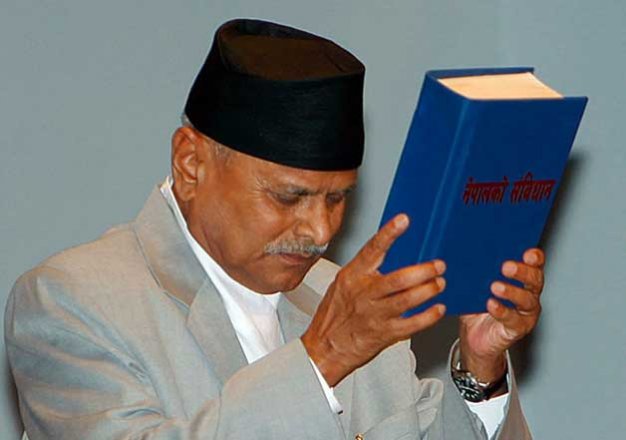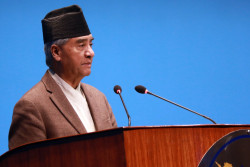Opinion

A Constitution is regarded as the fundamental law of the land. It delineates the powers and responsibilities of various organs of the state, imposes reasonable restrictions upon them, and regulates the relationship between the people and the state or the law and the people.
With the enactment of the new Constitution, Nepal is transformed into a republican state from a constitutional monarchy, a federal democracy from a unitary system of governance, and a secular structure from a Hindu character.
Unlike the Constitution of the United States and Australia, which provide only for the federal government, the Constitution of Nepal - like that of India’s - provides for both federal (Central), provincial and local (Village Councils and Municipalities) governments. Special provisions are made to uplift weaker sections of society. The preamble appears as a goal setter.
All the governmental organs and institutions owe their origin to the Constitution and derive their powers from the Constitution itself. The Constitution of Nepal mandates that the powers of the state must be exercised within its bounds. It means the statute is supreme here. In this context, Article 1 provides that the laws enacted against the Constitution would be void to that extent of inconsistency.
From ensuring constitutional supremacy to garnering rule of law to strengthening federal democracy, the Constitution of Nepal - which came into force on Asoj 3, 2072 BS [September 20, 2015] - hosts a good deal of provisions to consolidate democratic practices. While celebrating the seventh Constitution Day this year on Monday, it is high time we upheld our progressive provisions and disseminated this message to the world. Our Constitution is one of the most progressive documents. We have ample reasons to celebrate with it. Let me shed light on some of its progressive provisions.
Supremacy of Constitution
Article 1 of the Constitution opens with a marginal note of “Constitution as the fundamental law” which itself has a rationale that the Constitution is supreme in the state. It envisages that the laws inconsistent with the Constitution shall be void to the extent of such inconsistency. It shall be the duty of every person to uphold the Constitution.
Moreover, the preamble of the Constitution affirms the sovereignty of “We the people,” who are committed “to fulfill the aspirations for perpetual peace, good governance, development and prosperity through the medium of democratic republican system of governance” and thus “hereby promulgate this Constitution through the Constituent Assembly.” The concluding part seeks to unite the citizens in an enduring sense of duty to uphold the constitutional norms.
The preamble begins with the opening words of ‘We, the people” just like the United Nations Charter or the Constitution of the United States. Unlike the US Constitution, the framers of our Constitution have made an important claim that Nepal is both a republic and a democracy. The US Constitution carries the word ‘republic’ in place of ‘democracy’.
Progressive fundamental rights and inclusive features
The Constitution ensures the rights of women as a fundamental right under Article 38. In addition to this, the constitutional provision setting aside 33 per cent representation of women in Nepal’s legislature is a major breakthrough. Nepal sets aside 33 per cent of the 166 parliamentary seats for women under Article 84(8). Similarly, Article 86 (2) (a) ensures three berths in the 59-member national assembly, where eight members are elected from each province. However, India has been considering adopting a similar constitutional framework since 1996.
The modern trend of guaranteeing fundamental rights to the people may be traced to the Constitution of the USA promulgated in 1787. The US Constitution happens to be the first modern rulebook of a state to lay down a concrete foundation of the concept called human rights by embodying them under the constitutional framework and ensuring their enforceability by the courts.
Apart from equality, non-discrimination and criminal justice administration, Nepal’s constitution is home to scores of unique provisions, like the right to senior citizens, rights of women, the right to seek compensation from polluters and the right to language and culture.
Nepal is the first and foremost country in South Asia to explicitly recognise the fundamental rights of sexual minorities. Article 12 of the Constitution is a welcome provision that confers an individual to seek a citizenship certificate along with gender identity.
Now, it is a well-settled law that an individual can choose his gender identity by his own declaration, without any third-party intervention. This intervention could have been an insistence on surgery, a medical diagnosis or any other such practice. The Supreme Court of Nepal in the case of Sunil Babu Pant v. Government of Nepal in 2007 held that the persons were entitled to select their gender identity based on their “self-feeling.”
Moreover, our Constitution hosts provisions for environmental conservation and enhancement. Recognising the polluter pays principle, Article 30(2) envisages that the pollution victims have the right to seek compensation from the individuals or entities responsible for the pollution.
Economic rights, like the right to housing, the right to employment, and the right to food security and food sovereignty have been guaranteed as fundamental rights. Though their enforceability depends upon the economic well-being of the state, their presence in the constitution as inalienable rights would keep reminding the governments to scale heights in the field of economy and infrastructure.
Concerns of Madhesh
The charter failed to strike a balance between the dominant views (that is, the agendas of the major political parties) and the minority views (that is, the agendas of the Madheshi parties). As a result, the agitating Madheshi parties refused to give a stamp of approval to the new Constitution, arguing that the “statute is not a broad-based document” and it would “politically marginalise the Madheshi people.” However, this is a completely baseless claim.
Madheshi parties have shown their reservation on many issues, like delineation of electoral constituencies, sketching of federal boundaries, citizenship, judiciary, and preamble for not recognising the Madhesh movement. In content and intent, the Madheshi parties have already accepted the Constitution as they share power and hold vital government offices both at the centre and province, under the constitutional mandate. So far as the citizenship provision is concerned, our Constitution does not leave anyone stateless.
The 2015 Constitution provides that there would be two modes of obtaining citizenship, namely, citizenship by descent and citizenship by naturalisation. In this context, Article 11(3) stipulates that a person is eligible to acquire citizenship by descent when it is proved that ‘his/her father and mother both are citizens of Nepal.’ However, on non-fulfillment of this clause, meaning where a child whose ‘father or mother’ is a Nepali, a person is entitled to get citizenship by naturalisation. But the practice shows that if a father is a citizen by descent and the mother is naturalised, in such a case, a child is entitled to get citizenship by descent.
Moreover, if a person’s father is found to be a foreigner, he would get naturalised citizenship (Article 11-5). Similarly, a foreign woman married to a Nepali citizen is entitled to get naturalised citizenship of Nepal. Interestingly, Article 11 (7) of the Constitution allows a child born to a Nepali woman and a father from a foreign country, to acquire naturalied citizenship. This way, the
Constitution does not leave anyone stateless.
To be very frank, constitutionally, there is no problem at all. But the problem has been created by the so-called Madheshi Messiahs who have instigated the people of Terai to launch public protests to land plush positions at government offices in return..
If they were honest with their claims, they would not have assumed vital government positions within the constitutional frameworks against which they had protested in 2015. They had championed a 135-day blockade along the Indo-Nepali border during a protest that claimed more than 40 innocent lives.
What next?
The government agencies could translate the Constitution into Maithili, Bhojpuri, and English, among other languages, and distribute free copies to the people. There could be brief notes on constitutional provisions in different languages. This would help the people to understand the constitutional provisions in the language they understand. Most importantly, it would curb the role of instigators.
Our Constitution is home to progressive provisions. All we need, now, is to implement them.
Mere enactment of promising fundamental rights without a commitment to enforcing it would be of no use. So, it is high time that we enforced fundamental rights, like the right to a clean environment, the right to housing, or the right to seek employment, in the true and material sense. After all, Nepal deserves a healthy democracy where rights are meant to be implemented in letter and spirit.






